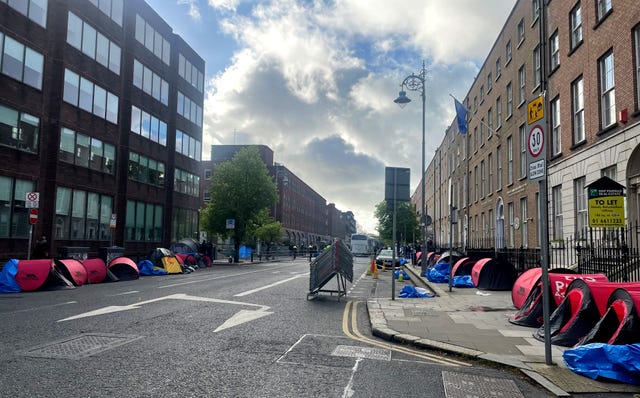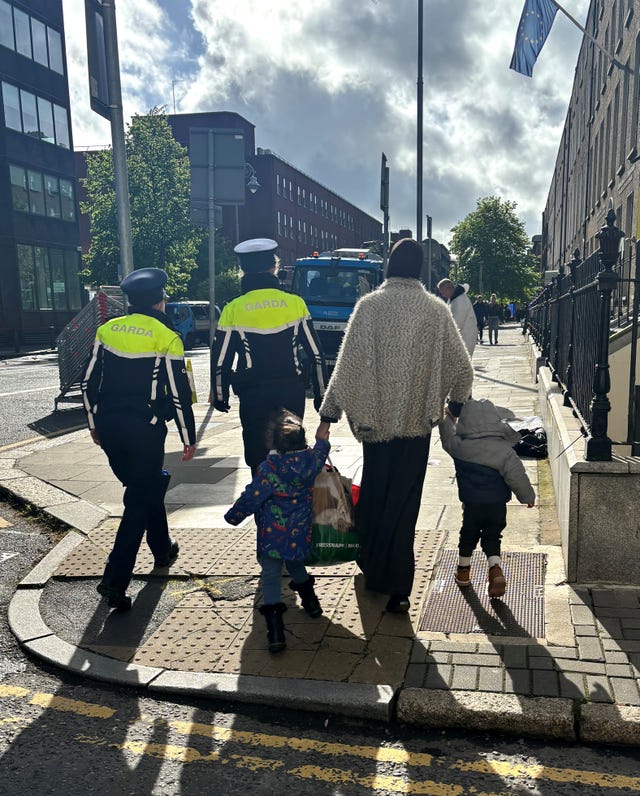Hundreds of asylum seekers moved from Dublin city centre to tented accommodation
It comes after an operation was undertaken in the city centre.

Hundreds of asylum seekers who had been living in tents in Dublin have been moved to international protection facilities at the Citywest hotel and at a site at Crooksling in Co Dublin, the Government has said.
It comes after an operation was undertaken in the city centre to move hundreds of asylum seekers who had been sleeping in the large encampment of tents.
In recent months, migrants have been sleeping rough beside the city’s International Protection Office on Mount Street as the state struggles to source enough accommodation for people seeking asylum.
The operation to move the makeshift camp that began early on Wednesday morning comes amid increasing diplomatic tensions between the UK and Ireland after the Irish Government expressed concern about an upsurge of asylum seekers entering the state via the land border from Northern Ireland.

In a statement, the Government said that the people seeking international protection had been moved safely to the two sites.
A statement said: “The Crooksling site has robust, weather-proof tents.
“It has toilets and showers; health services; indoor areas where food is provided; facilities to charge phones and personal devices; access to transport to and from Dublin City Centre; and 24-hour onsite security.
“While in Crooksling accommodation, residents will receive the same supports as at other locations.
“This includes access to medical care via the HSE social inclusion outreach teams and medical card provision; Ipas customer services team clinics; onsite support from the provider’s staff; and psycho-social and integration support from NGO partners.
“The encampment at Mount Street has been dismantled and the streets are being cleaned by Dublin City Council.”
Asylum seekers congregated in groups waiting with their luggage as buses and taxis arrived to take them to another site where basic facilities will be offered.
Mount Street was cordoned off during the operation, with a large number of gardai present.
“Access was only granted to residents of the street and workers involved in the removal operation.
“Health personnel also participated in the multi-agency initiative.”
A similar operation to remove tents from the area was undertaken in March, but another makeshift encampment soon built up again.
Deputy Irish premier Micheal Martin said the operation was to ensure the “safe movement of people” who are seeking asylum.
Mr Martin said: “The tents on Mount Street are not acceptable, not acceptable for migrants and not acceptable for residents living in the area either.
“It’s very important that we do this properly and our objective is to make sure that we continue to provide accommodation of this kind, and as well faster processing of those seeking asylum, particularly from designated safe countries and from those with the highest number coming in, in respect of Nigeria.
“That does mean a faster processing of asylum seekers and also firmer approach too.
“Our view is that it is not acceptable that tents should be on Mount Street and we would discourage that very strongly.
“We don’t envisage them returning.
“The state has, within its powers, the capacity to make sure we don’t have tents back up on Mount Street or other streets and in our view the Government is very clear that we can’t have tents in streets adjacent to neighbourhoods.
“It’s not good for those seeking asylum and not good for residents in the area, and it creates a lot of tension which are not acceptable.
“There is a determination on the Government’s side to use capacity and powers to ensure that it doesn’t occur into the future.”

“There is no comparison between the situation of people being in tents on streets and in an environment like Crooksling that has facilities.
“It’s not ideal but we have a very significant increase in the number of asylum seekers coming into the country.
“It’s a five-fold increase on what one was experiencing in 2019, and the figures this year suggest almost a doubling on the same period last year.
“There are pressures on accommodation.”
A Government statement outlined details of Wednesday’s operation: “A joint operation between the Department of Children, Equality, Disability, Integration and Youth; the Department of Justice; An Garda Siochana; Dublin City Council; the Office of Public Works; and the HSE (Health Service Executive) is under way on Mount Street, Dublin.
“The purpose of the operation is to ensure the safe movement of people seeking international protection from the tents on Mount Street to International Protection Accommodation Service (Ipas)-designated accommodation.
“The Ipas-designated accommodation has toilets and showers; health services; indoor areas where food is provided; facilities to charge phones and personal devices; access to transport to and from Dublin City Centre; and 24-hour onsite security.”
Irish Labour Party leader Ivana Bacik said the encampment was “inhumane and unsustainable”.
She said the situation demonstrated a “failure” of Government policy on migrant accommodation.
“The conditions on Mount Street for the 200 men who were forced to sleep here in tents had become inhumane and unsustainable,” she told the PA news agency.
“And I did yesterday in the Dail, and indeed on previous occasions, call on the Taoiseach and the Government to address the situation and to find appropriate safe and secure accommodation for the men who are in the tents.
“I’m glad to see that that has been done.
“I will be pressing now to ensure that the accommodation is safe and secure and that it’s appropriate, so that we don’t see this sort of build-up of people living in such desperately unsanitary and unhealthy conditions again on Mount Street or indeed anywhere else.”
Noel Wardick, from Dublin City Community Cooperative, an organisation that has been providing support to the asylum seekers sleeping rough, said it was vital that the alternative accommodation was appropriate.
He said that was the key failure of the last removal operation in March.
“The jury is out from the point of view we don’t know where the men are going,” he said.
“And we don’t know the conditions on the site.
“So we would expect that the state has provided sufficient sanitation, water, hygiene, and blankets, warm accommodation.
“However, that wasn’t the case on March 16 when they last dismantled the site in a very shambolic, ham-fisted and chaotic manner.
“So let’s hope all those lessons were learned and the men are in a vastly improved situation.”





